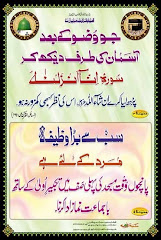
MUHAMMAD (SALLAL LAAHU ALAIHI WASALLAM) IS A LAWMAKER
There is a difference between one who knows the law and a lawmaker. One who knows the law refers to that person who is aware of the complete and partial aspects of law. With this he should have the ability to solve a problem from law. An example of this is an attorney or an advocate. These persons are only knowers of the law no matter how intelligent they may be. These persons do not have even the right to make a single change to any law. They are not permitted to change any law that has already been established by the Judiciary, even though they may have the expertise to do so. They draw evidence from laws already established, to make an argument for their case, which debate sometimes for weeks and months, but they cannot change the actual law, and cannot even change the context of such law. An example of this in Islam is the Ulama, who have the knowledge of the fundamentals and principles of Shariah (Islamic law). They have such expertise, that they can solve problems presented to them to an extent, where they are able to firmly answer the objections made on Islamic issues. They however have no right to change any established Islamic law. They cannot change the actual law and cannot even change the context of such law. As for the lawmaker, who must be worthy of being a special personality, he may change the law when he wants, whatsoever he wants either by himself or by the authority vested in him by the actual maker of the law. An example of this in present times is the Ruling Emperor, who has the right to make any law and to change any law when and how he deems necessary. The second example is that of the Minister, who on the authority of the Emperor or King, may make or change any law.
Now that we have understood the meaning of the terms Knower of Law and Lawmaker, now let us examine the same in the light of the Shariah, and search to find whether the Holy Prophet Muhammad (sallal laahu alaihi wasallam) is only the possessor of knowledge, or is also a Lawmaker through the permission granted to him by Almighty Allah. There are a few views in this debate:
1. The Prophet (sallal laahu alaihi wasallam) is a lawmaker through the permission of Allah In the light of the Quraan.
2. The Prophet (sallal laahu alaihi wasallam) is a lawmaker through the permission of Allah In the light of the Hadith.
3. The Prophet (sallal laahu alaihi wasallam) is a lawmaker through the permission of Allah In the light of Authentic Testimony.
4. What were the views of the Ummah before this Era.
IN THE LIGHT OF THE QURAAN: If we make research from the Quraan, then we will find much information relating to this. Even if we browse through the Quraan, we will find evidence of this. When reciting the Quraan, we will find verses that say, Obey Allah and His Apostle, Whomsoever disobeys Allah and His Prophet, are sinners and tyrants, whose destination is Hell. None have doubt in the fact of Almighty Allah being the Sole Controller and Lawmaker. It is evident that Almighty Allah is the Creator, Bestower, Cherisher etc, but it is also clear that it is also compulsory to obey the Prophet (sallal laahu alaihi wasallam). It must thus be accepted, that just as Almighty Allah changes, commands and specifies, through His permission and His Bestowing, the Holy Prophet (sallal laahu alaihi wasallam) also has the control over everything, and this is in actuality, the meaning of a Lawmaker. With the exception of these general explanations, let us also examine a few specific points.
Almighty Allah says, O Beloved You say! If you love Allah, then obey Me. Allah will make you His beloved. Every person knows that the meaning of obedience, is this, that one should follow every command that has been given, and to practice accordingly. From this verse, it is evident, that we have to obey any command that is given by the Prophet (sallal laahu alaihi wasallam). This shows, that the Prophet (sallal laahu alaihi wasallam) has been blessed with the right to give any command He wishes to the Ummah. This is the meaning of a Lawmaker. Almighty Allah says, Whomsoever does contrary to the command of the Prophet after the truth has been made apparent, and who go on the path of any other than that of the believers, We will then turn him in the direction to which he has gone and will place him in hell. This is a bad destination.
To go against the command of the Prophet (sallal laahu alaihi wasallam), here means to refute or go against anything He says, or act against anything He commands. It is for this reason, because His every command, is the law of Islam and He whose every command is the Law of Shariah, is definitely a Lawmaker, and not only a Knower of the Law. It is as follows in Surah Noor: For those who act against the command of the Prophet, they should fear that they are not caught up in corruption and that a painful torment does not befall them. The warning for those who act against the command of the Holy Prophet (sallal laahu alaihi wasallam), is for this reason, that to act in any way against Him is to act against the Shariah, and this is only the right of a Lawmaker, and not that of only a Knower of Law.
IN THE LIGHT OF AHADITH: Hadith No.1: The Prophet (sallal laahu alaihi wasallam) said,I have left two things with you. As long as you remain firm on this, you will not go astray. The Quraan and my Sunnat.
None object to the fact of the Quraan being the law of Shariah. However the Prophet (sallal laahu alaihi wasallam) also kept His Sunnat the law of Shariah. It is therefore only proper that we accept the Prophet (sallal laahu alaihi wasallam) as a lawmaker.
Hadith No.2: Imam Abu Da ud (radi Allahu anhu) narrated a Hadith from Hazrat Irbaaz bin Saaria (radi Allahu anhu), in which the Prophet (sallal laahu alaihi wasallam) said, Listen! By Allah! I have commanded certain things, and forbidden certain things. Verily these (commands) are equal to that of the Quraan.
Hadith No.3: Imam Bukhari, Muslim and Nasai narrated the following Hadith on the Authority of Hazrat Ibn Abbas (Radi Allahu anhu), If I had not thought that it would be inconvenient for my Ummah, then I would have commanded them to pray Esha at that time, in other words at half the night.
Hadith No.4: The Holy Prophet (sallal laahu alaihi wasallam) said, Do not drink things that intoxicate. I have made all intoxicants Haraam.
When we read all these Ahadith carefully, we will find that those who have only accepted those things to be Halaal which have been made Halaal by Allah, and those things to be Haraam, which have been made Haraam by Allah, and do not accept that to be either Halaal or Haraam, which has been made Halaal or Haraam by the Prophet (sallal laahu alaihi wasallam), how hard the torment has been sent upon them. The Prophet (sallal laahu alaihi wasallam) has further stated, all those things, which I have made Halaal, and all those things which I have made Haraam, are equal to that which Almighty Allah has made Halaal and made Haraam. Can any person who has no authority over making laws make such a statement? This shows that the Prophet (sallal laahu alaihi wasallam) has been blessed with the opportunity of making laws, through the permission of Almighty Allah.
TESTIMONY OF SAHABA-E-KIRAAM: The proof of testimony of Sahaba-E-Kiraam in this matter is so vast, that all of them cannot be quoted here, but a few of them are being quoted for your perusal.
1. It is on the narration of Hazrat Abu Hurairah, that a certain Sahabi came into the Court of the Prophet (sallal laahu alaihi wasallam) and said, I have been destroyed. The Prophet (sallal laahu alaihi wasallam) asked what had happened, and He replied by saying, I had sexual intercourse with my wife while fasting (during Ramadaan) The Prophet (sallal laahu alaihi wasallam) said, Can you free one slave? He replied in the negative. The Prophet (sallal laahu alaihi wasallam) then asked if He had the strength to keep sixty (60) fast continuously, and He replied in the negative. The Prophet (sallal laahu alaihi wasallam) then asked if He had the means to feed sixty poor people, and He replied in the negative. Just then someone presented some dates. The Prophet (sallal laahu alaihi wasallam) asked Him to donate this to the poor. He replied by saying that there was no one more deserving in Madinah, than His family. On hearing this, the Holy Prophet (sallal laahu alaihi wasallam) smiled so much that His Blessed Teeth began to show. He then said, Feed it to your family.
2. It is narrated in Tibraani, Musnad Abu Yal aa etc. on the Authority of Hazrat Haarith bin Usaama bin Nu man bin Basheer (radi Allahu anhu) and also personally from Hazrat Khuzaima (radi Allahu anhu) that the Prophet (sallal laahu alaihi wasallam) said, If Khuzaima gives testimony contrary or in agreement to anyone, then his testimony alone is acceptable. Whereas the Holy Quraan states, make two just persons from amongst you testators (witnesses). But the Holy Prophet (sallal laahu alaihi wasallam) made the Testimony of Hazrat Khuzaima alone, equivalent to that of two witnesses. This alone is proof, that the Holy Prophet (sallal laahu alaihi wasallam) is a lawmaker.
VIEWS OF THE UMMAH BEFORE THIS ERA: It is in the Sunnan of Abu Da ud and Ibn Majah and the Musnad of Imam Tahtawi etc. on the authority of Hazrat Khuzaima, that, The Prophet (sallal laahu alaihi wasallam) specified the duration for masah on the leather sock to be that of three days and if someone had to ask, then He would have definitely changed it to five days.
1. Imam Abdul Wahab Shu raani (radi Allahu anhu) states in his Mizaanush Shariatul Kubra, that Almighty Allah has given the Prophet (sallal laahu alaihi wasallam) the authority to command whatever He wishes from His side.
2. Imam Ahmed Khateeb Qastalaani states in Mawahib as follows: It is from amongst the uniqueness of the Prophet (sallal laahu alaihi wasallam), He could change any law of the Shariah with whichever law He desired.
3. Imam Zirkaani (radi Allahu anhu) states, There is no specification in commands. He could change anything which he wished with anything He wished, by making it specific.
These are some of the quotations of the Learned predecessors, which prove that the Holy Prophet (sallal laahu alaihi wasallam) has been blessed with the authority to make and change laws as He wished. If anyone wishes to note the belief and the thoughts of the present Ummah, then they should peruse Aala Hazrat s (radi Allahu anhu) Al Amn-wa- Ulaa etc.

































